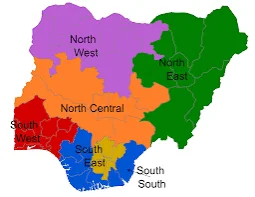Minimum-Wage-in-Nigeria:-A-Historical-Overview-of-Approved-Amounts-from-1960-to-2024
The concept of minimum wage, designed to ensure a basic standard of living for workers, has been a critical issue in Nigeria since independence. The journey of minimum wage adjustments reflects the socio-economic realities of each era, government priorities, and the persistent struggle of workers for fair compensation. This article traces the history of minimum wage adjustments in Nigeria from 1960 to 2024, highlighting the approved amounts and the broader implications for the nation's labor force.
1. Post-Independence Era (1960-1970)
Nigeria gained independence in 1960, and the immediate post-colonial period was marked by significant challenges, including the need to stabilize the economy and address labor issues inherited from the colonial administration. During this period, there was no formal minimum wage law, but wage adjustments occurred sporadically through negotiations between workers' unions and employers. The prevailing wage structure was largely influenced by colonial practices, with disparities in pay based on race and job categories.
2. The First Minimum Wage Law (1970-1980)
The first significant move towards establishing a national minimum wage in Nigeria came in 1981, following the 1970s oil boom, which significantly increased the country's revenue. In response to growing demands from labor unions, the Shehu Shagari administration passed the Minimum Wage Act of 1981, setting the minimum wage at ₦125 per month. This amount was seen as a substantial improvement at the time, reflecting the government's intention to distribute oil wealth more equitably among Nigerians. However, the benefits were short-lived as inflation and economic mismanagement began to erode the real value of wages.
3. The Structural Adjustment Program Era (1980-1990)
The 1980s were marked by economic turmoil, culminating in Nigeria's adoption of the Structural Adjustment Program (SAP) under the guidance of the International Monetary Fund (IMF) and the World Bank. The SAP aimed to stabilize the economy through austerity measures, but it led to widespread hardship for the average Nigerian. During this period, the military government under General Ibrahim Babangida revised the minimum wage to ₦250 per month in 1989. Although this represented a doubling of the wage floor, the harsh economic conditions meant that the increase did little to improve the purchasing power of workers.
4. Economic Instability and Wage Adjustments (1990-2000)
The 1990s were characterized by political instability and economic decline. The minimum wage saw another adjustment in 1991 under the Babangida administration, increasing to ₦500 per month. However, the devaluation of the naira and rising inflation continued to undermine the real value of wages. In 1998, under General Sani Abacha, the minimum wage was raised to ₦3,000 per month. This increase was more substantial compared to previous adjustments, reflecting the government's attempt to placate growing dissatisfaction among workers. However, the repressive nature of the regime meant that labor unions had limited power to push for further improvements.
5. Democratic Reforms and Wage Increases (2000-2010)
With the return to democracy in 1999, Nigeria saw renewed efforts to address labor issues. The administration of President Olusegun Obasanjo revised the minimum wage to ₦5,500 per month in 2000. This move was part of a broader strategy to stabilize the economy and reduce poverty. In 2011, under President Goodluck Jonathan, the minimum wage was further increased to ₦18,000 per month, a significant jump aimed at improving the living standards of workers amid rising costs of living.
6. Economic Recession and Stagnation (2010-2020)
The period between 2010 and 2020 was marked by economic challenges, including a recession in 2016 driven by a sharp decline in oil prices. Despite these challenges, the Nigerian government made another significant adjustment to the minimum wage in 2019, raising it to ₦30,000 per month under President Muhammadu Buhari. This increase was the result of prolonged negotiations between the government and labor unions, who argued that the previous wage had become grossly inadequate to meet the basic needs of workers due to inflation and currency depreciation.
7. Recent Developments and the Future of Minimum Wage (2020-2024)
The economic impact of the COVID-19 pandemic, coupled with ongoing inflationary pressures, has continued to strain the finances of the average Nigerian worker. Despite these challenges, the Nigerian government has so far maintained the ₦30,000 minimum wage set in 2019. As of 2024, there have been discussions about further increases to the minimum wage to reflect the rising cost of living and ensure that workers can maintain a basic standard of living. However, the implementation of such increases remains uncertain, given the fiscal constraints facing the government.
8. The Impact of Minimum Wage Adjustments
The history of minimum wage adjustments in Nigeria reveals a pattern of periodic increases that often fail to keep pace with inflation and the cost of living. While each adjustment has been welcomed by workers, the real value of wages has often been eroded by economic factors such as inflation, currency devaluation, and economic mismanagement.
Moreover, the implementation of minimum wage laws has been uneven across the country, with some state governments struggling or outright refusing to pay the approved amounts. This has led to disparities in income and living standards between workers in different regions and sectors.
9. Conclusion: The Way Forward
The history of minimum wage adjustments in Nigeria from 1960 to 2024 underscores the need for a more sustainable approach to wage policies. While periodic increases are necessary, they must be accompanied by broader economic reforms that address the root causes of inflation and economic instability. Additionally, there needs to be greater enforcement of minimum wage laws to ensure that all workers benefit from the approved amounts.
As Nigeria continues to grapple with economic challenges, the government must prioritize the welfare of its workers by ensuring that the minimum wage reflects the realities of the cost of living. This requires not only periodic adjustments but also a commitment to economic policies that promote stability, growth, and equitable distribution of resources. Only then can the minimum wage serve its intended purpose of providing a decent standard of living for all Nigerian workers.




Comments